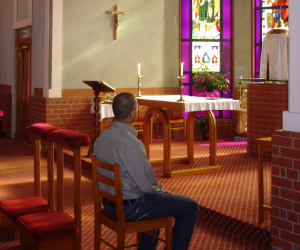
“Jesus called those he wanted to be with him. They were to be his companions.”
Mark 3:13.
This is the relationship we are invited into with Jesus – companionship. This is what prayer can be – spending time with a good friend. God meets me where I am, I meet God where I am. I can trust that God is already with me and all I have to do is take time to be open, waiting and listening.
Where to start with prayer
Use the “Jesus Prayer“. It consists in uttering the single word “Jesus” in any situation, at any time and place, either aloud or silently. It is the simplest of all prayers, but powerful in its ability to connect us with God.
St Ignatius of Loyola encouraged people to pray in the midst of their daily life and to ask for the grace: “To see thee more clearly, love thee more dearly, follow thee more nearly, day by day.” Start asking!
There are many examples of guided meditation, both written and spoken, on the internet and in app stores eg Loyola Press’s 3- Minute Retreat app.
Use the website Sacred Space https://www.sacredspace.ie/ for short meditative prayer each day.
Make a Retreat in Daily Life as a way to go deeper on your God journey with people from your own pastoral area. These retreats are available in the Archdiocese of Wellington in a different parish each month. See if there is one near you.
Find a Spiritual Director to encourage you with your prayer journey.
Lectio divina is a Latin term meaning “reading with God”. It has been practiced in the Church for centuries, and has its origins in monastic life, but is being used now by lay people and religious alike. Lectio divina is a way of praying using Scripture, which if practiced consistently, gently leads us into a deeper relationship with Christ as we open ourselves to him. It is the ultimate DIY spiritual project. The practice of Lectio divina requires a quiet space, a passage of Scripture, and the willingness to give a little time to it each day (or even a couple of times a week). The passage of Scripture used should be short. It could be the gospel for the day or a piece taken by progressing through one of the gospels. The New Zealand Catholic Bishops Conference 2011 Lectio divina booklet can be downloaded here.
Meditation
Meditation is a form of prayer which enables us to become calm, and to focus on the presence of God. Meditation can involve several steps:
Find a good time and a good place. A good time is when you are able to focus and are not in danger of falling asleep. A good place is quiet, calming, and peaceful.
Breath deeply and slowly. Focus on a word or phrase which evokes the presence of God. It can be as simple as “Jesus” or Abba, Father”.
Align the word or phrase with your breathing, and let it draw you into an awareness of God’s presence. Distractions can happen but just return to the word. If the word fades and a sense of peace envelopes you, let it happen.

and the Word was with God…Jn 1:1
Spirituality
Spirituality defines one’s whole way of life − a way of being, seeing and acting. Christian spirituality is inspired by the person and vision of Jesus Christ. It has its source in our communion with God and is forged in communion with others and with all of creation. It is a spirituality of relationships. Characteristics of a Catholic Christian spirituality include:
A belief in the Trinity as the model of communion between people
A commitment to liturgy, especially the Eucharist, communal and personal prayer
A spirit of collaboration
An ecumenical commitment to unity
An inclusive attitude to the world
A readiness to dialogue with all people of goodwill
A passion for social justice and human rights
A view of the natural environment as God’s creation to be loved and cared for.
Types of Spirituality
There are many different expressions of Catholic spirituality that have developed over the past 2000 years. Many of these reflect the charism of founders of religious orders who developed their own way of approaching God in prayer and of living the Gospel. Their different spiritualities are gifts to us all, and are worth researching in order to understand how they are expressed practically:
Desert –solitude, asceticism, sacrifice and centering prayer, meditation on a single, sacred word.
Benedictine –life in community, order and obedience to superiors. Lectio Divina, is a Benedictine prayer form based on reflection on the Word of God.
Franciscan – poverty, love of nature and giving to those in need. Franciscan prayer rejoices in God’s presence in the wonder of creation.
Dominican –poverty, preaching and devotion to truth. As a simple way of proclaiming the truths of the faith, the Rosary is an example of Dominican spirituality since it focuses on the mysteries of Christ’s life.
Ignatian –daily examination of one’s life, discerning the will of God and living the Resurrection. The Spiritual Exercises are the Ignatian prayer form that focuses on this examination of conscience and the discernment of God’s action in one’s life.
Carmelite –interior detachment, silence, solitude and mystical experience. The “dark night of the soul” describes the need for spiritual purification before entering into divine union with God.
Josephite –simplicity, perseverance and care for the poor. Josephite prayer reflects trust in God’s provision to care for those in need.
Discernment
Discernment is a process of making decisions or arriving at answers in a prayerful way.
Many people will be familiar with it in the context of The Spiritual Exercises of St Ignatius Loyola, the founder of the Jesuits.
Father James Martin SJ explains the essence of discernment: “At heart, the process begins with the belief that God wants a person, or a group, to make good, healthy and life-giving decisions; and through the ‘discernment of spirits,’ that is, sorting out what is coming from God and what is not, one gains clarity about the best path. God therefore both wants and enables individuals and groups to arrive at good decisions.” Our relationship with God is at the heart of discernment. God respects our freedom by acting very gently with us. This means that we need to continually fine-tune our listening to God.
Listening to God amid the other interior and exterior voices in our lives is discernment. How do we know that we are listening to God and following the movement of the Spirit within ourselves? Ask, “Am I at peace with this? Am I at ease now, especially if what I had previously thought was the best course of action is not what I now think? Or am I uneasy or anxious?”
A good discernment process brings clarity and inner peace. If there is unease or anxiety, personal issues may be getting in the way, and it may not be God’s way for us.
A simple discernment process can help us make decisions about choices we have to make. It allows God to enter into our decision-making, and helps us to understand what God is calling us to do. The steps in discernment are explained well here.